#Distress Tolerance
Text
Today I accepted something small that was upsetting me and I could not change. I accepted it several times and noticed my irritation decrease each time I did it.
I said to myself, “I understand I cannot change this, I accept the fact that this is the way it is. I allow myself to have this feeling of irritation.”
I feel better now and I’m glad I did this exercise.
#actually bpd#mental health#recovery#borderline personality disorder#mental illness#positivity#radical acceptance#distress tolerance
400 notes
·
View notes
Text
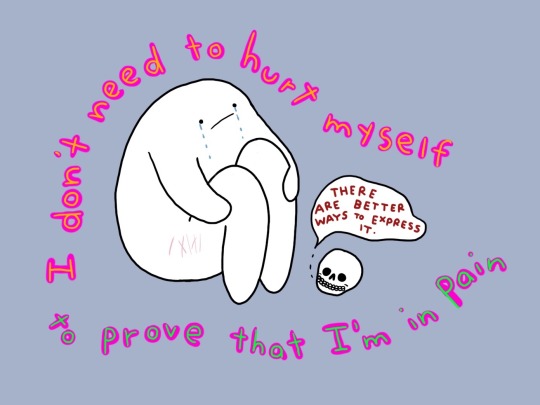
#redraw#emotional regulation#distress tolerance#doodles#bad art#lousy drawings#doodle#positivity#self love#healing#recovery#trauma recovery
1K notes
·
View notes
Text
This one’s for all my friends on here with problems.
If you’re having a trauma or anxiety episode, if you’re thinking about killing yourself, you just need to make it through tonight. The morning won’t make everything good, but things will be better.
Do what you need to do. If you’re struggling to make it through this moment, there are things like exercise for anxiety, cold water on the face for anxiety or flashbacks, other distress tolerance skills. Use your skills, white knuckle it. Don’t use substances or behaviors. Surf the urge.
Try to get some sleep. It’ll be better if you do, but the morning will still be better than the night if you don’t. If you can’t sleep, see if you can lie down and listen to or watch something comforting, maybe with your eyes closed.
If you can’t do that, see if you can be kind to yourself. Maybe that feels natural right now, maybe it doesn’t. Maybe you don’t deserve it. Try it anyway. If there’s some cosmic (or literal) debt to be paid for it, you can pay it in the morning.
Try to be kind. If you can eat, eat something comforting. If you’re in a bed or couch, maybe curl up with a soft blanket or stuffed animal. Smell something that smells like home.
This isn’t about solving the problem, this is about getting you to a place where solving the problem might be possible. It’ll probably take more than a night. But right now, we’re just making it through to see the sun again.
#mental health#suicide#suicidal ideation#panic attack#depression#anxiety#ptsd#mental illness#coping skills#distress tolerance#mental distress#DBT#ptsd recovery#ptsd thoughts#anxiety attack#addiction#eating disoder recovery#alcoholism#substance use disorder
407 notes
·
View notes
Note
How would we deal with the possibility of gaining factives of family that passed? I dont wanna ignore them but its hard to know and accept they’re here. Help…. xc
Hey there -
Gaining a headmate who is an introject of a deceased family member sounds like it could be a scary, overwhelming, and painful experience. Honestly, we can’t help you more than a therapist could, and if you’re not in therapy, it would probably be a good idea to try seeing one soon, if your system is capable of it.
Have you tried talking to this factive a bit about your situation? Explaining how their source is a loved one who has passed away, and talking through your complicated feelings with them? Depending on how attached to their source they are, they may be able to see where you’re coming from and have some ideas of their own about how they’d like to be treated and how your system can navigate this situation in a way that works for everyone.
This might not be popular advice, but if it makes things easier for y’all, maybe you could try viewing this headmate as someone separate from their source. Like, as a person who happens to have the same name and similar characteristics. It’s true that introjects are not literally their sources, and so viewing your headmate in this lense might help your whole system have easier, healthier, and more positive interactions with this factive.
Also, it’s okay to go slow. If interacting with this factive is causing you a lot of pain or distress, it’s okay to limit your interactions, at least at first. This doesn’t mean you’re ignoring them or mistreating them… rather, it means you are trying to prioritize your own mental health and well-being. It’s like they say on airplanes in the event of an emergency; always secure your own oxygen mask before helping those around you. You need to look after yourself, and forcing yourself to interact with this factive right away probably won’t help anyone. If you’re able, you can try explaining this situation to them, and telling them that you need some time and space to process your emotions in a healthy way before you’ll be able to get to know them better. Or, if possible, you could ask another headmate to relay this message for you.
It might help your whole system to try building up your distress tolerance, so that interacting with this factive isn’t such an overwhelming experience. We love DBT for this - here’s the DBT Tools website page with exercises for building distress tolerance. Maybe something here could be useful for you?
Sorry that none of this is real definitive advice… like we said, a therapist would be of more help to you than we ever could be. We’re wishing you the very best in dealing with this, though, and hope that in the future your system and this factive will be able to live in harmony with each other.
💫 Parker and 🐺 Toby
15 notes
·
View notes
Text

#DBT#dbt memes#dbt problems#dbt skills#middle path#walking the middle path#emotion regulation#distress tolerance#meme#mental illness humor#cognitive distortions#nongifpost#therapy meme#treatment meme#recovery meme
95 notes
·
View notes
Text
My DBT skill graphics organized by module🩷
Please feel free to save them, share, print and submit requests if there’s any skills you’d like sooner than others (as I make more, I’ll add them to this post for easy access).
Mindfulness: FLAME
Emotion Regulation: ABC PLEASE
Interpersonal Effectiveness: GIVE, FAST
Distress Tolerance: STOP, TIPP
#bpd thoughts#actually bpd#bpd#dbt#dialectical behavior therapy#dbt skill#dbt skills#skills#skill guide#skills guide#guide#interpersonal effectiveness#distress tolerance#mindfulness#emotion regulation#emotional resilience#skills graphics’s#resources#resource#mental health#therapy#mental health resources
14 notes
·
View notes
Text
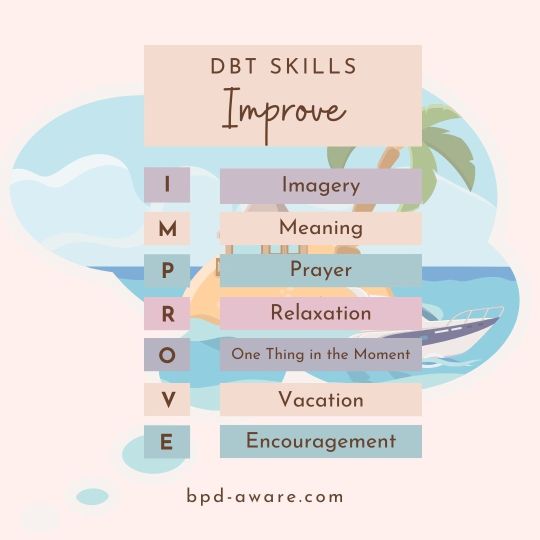
#borderline personality disorder#bpd#mental health#therapy#dbt#dialectical behavior therapy#distress tolerance
4 notes
·
View notes
Text
Feeling a little bit better about the girl (I'll start calling her A)...it does seem like it's what’s happening in her life that is causing the "shift" in communication. I know she has a health problem going on and a big deadline at work for Thursday. She is much more responsive today, so hopefully it's just this week?
Looking back, T was helpful, even if I was resistant during session. I was upset over always having these shit attachment reactions and dysregulation to any slight change that may indicate abandonment/rejection. So he started talking about different DBT skills to help with the dysregulation. Which I balked at because I feel like they don't help and I stay dysregulated for days, just wanting to SH with a spike in ideation. T asked when was the last time I SH'd. A few months ago. He then asked how often I SH'd when I first started seeing him. Almost every day. He pointed out I have improved around handling dysregulation and using skills instead of resorting to SH as the default coping.
I didn't want to hear it because the fact I have the dysregulation in the first place made me feel hopeless, believing what's the point if this is all my life will be. T said I probably will have some level of dysregulation throughout my life whenever I get triggered, but it's not all or nothing. I have made improvements and can "ride the wave" more than I ever did in the past. And I will continue to make improvements around getting triggered. The dysregulation won't be as intense or as extended.
After some processing (and sleep), I think I can absorb what T said and recognize he is right. I have made improvements. I get dysregulated, but can tolerate it more and know how to use skills to "ride the wave." It's not as intense and while it can last a long time, it still is less than it was in years past. Which of course sounds off the "better" alarms, but I guess I can bring that up with him tomorrow...
#cptsd#bpd#therapy#disordered attachment#emotional dysregulation#triggers#abandonment#rejection#hypervigilance#interpersonal relationships#dbt#coping skills#distress tolerance#emotion regulation#angriadm
5 notes
·
View notes
Text
DBT Reminder 🎗️
TAKE A REST
(R) Relax. stop, take a breath, step away.
(E) Evaluate. what's actually happening?
(T) Take Action. proceed mindfully, get to your goal as calmly & effectively as you can.
(S) Set a Goal. what do I need right now?
You might need to REST more than once in the same situation. If it doesn't work the first time, go back and try again. The desired outcome is to avoid impulsive reactions and destructive actions. Each time you remind yourself to REST and choose healthy coping skills, the more naturally it will come in the future.
You can do this! One REST at a time!
Source:
#dbt#dialectical behavior therapy#dbt skills#dbt reminder#mindfulness#emotional regulation#distress tolerance#therapy#self care#positivity#rest#bpd#actually bpd#actually boderline#overwhelmed#overstimulated#adhd#actually adhd#neurodivergent#recovery#self healing#reminder#you are loved#you are not alone#mental health#actually cptsd#cptsd#actually abused
14 notes
·
View notes
Text
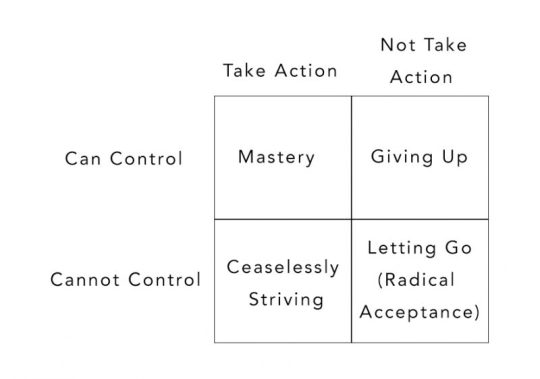
44 notes
·
View notes
Text
Distress Tolerance - IMPROVE strategy
Pulled together and paraphrased from a few helpful sources. These can help you increase your tolerance for difficult situations or moments.
The IMPROVE acronym: Imagery, Meaning, Prayer, Relaxation, One thing in the moment, Vacation, and Encouragement.
Imagery: Imagine yourself succeeding or solving the problem.
Meaning: Find meaning in your situation. Connect the situation to a greater purpose, or gain insights about yourself/others through it.
Prayer: Pray to something (deity, universe, your mind, etc.) to ask for strength and guidance. Also could include mantras and meditation.
Relaxation: Find a way to physically relax. Quiet space, sensory comforts, breathing exercises, stretching, etc.
One thing in the moment: Find a task that takes your whole attention and focus completely on it. One prominent example is a household chore like sweeping.
Vacation: Find a way to remove yourself completely from your situation. This could be a literal vacation, or a mental vacation where you imagine yourself doing something enjoyable and calming.
Encouragement: Give yourself positive affirmations or words of encouragement. Choose one that feels motivating to you personally, not just a trendy one.
Sources:
https://dbt.tools/distress_tolerance/improve.php
2 notes
·
View notes
Text
Distress Tolerance Work
I was given this bc I have a super low distress tolerance but it's really helpful, listen to this video then worksheet that's below it! https://dialecticalbehaviortherapy.com/distress-tolerance/resistt/
5 notes
·
View notes
Text
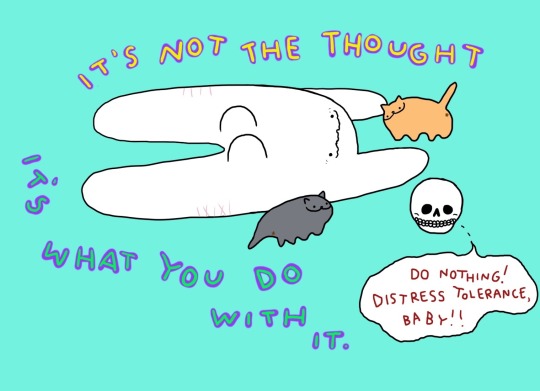
my main coping skill is laying on the floor w/ cats
#distress tolerance#thoughts aren’t actions#doodles#bad art#lousy drawings#doodle#positivity#self love#healing#recovery#therapy#cats
454 notes
·
View notes
Text
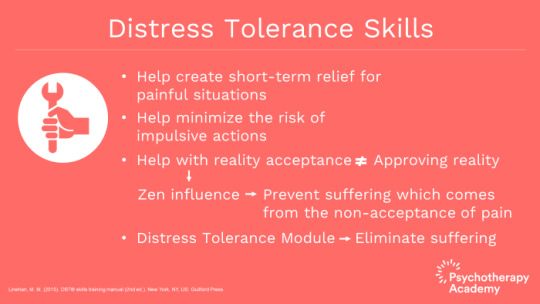
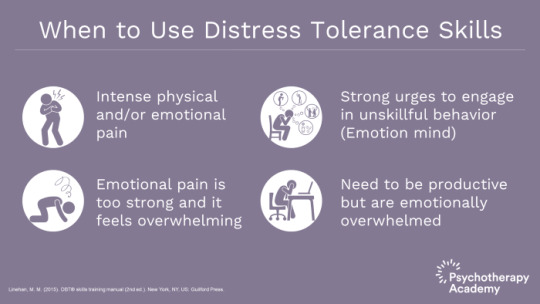
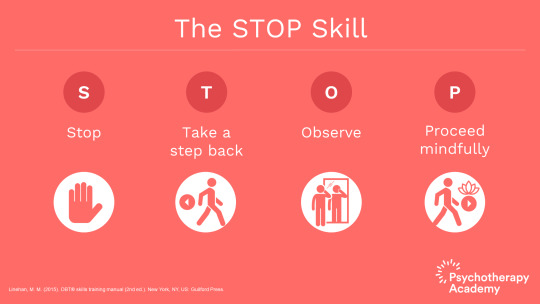


Some good distress tolerance skills for y’all if you need them, DBT has a lot of practical skills to use for people experiencing high levels of emotional distress or emotional regulation difficulties.
10 notes
·
View notes
Note
Hey, We were wondering if you have anything on coping with exomemories without the internet?
We have a few methods to stop our headmate from crying (character AI of sourcemates, fanfics, music, playing games) but we don’t always have the ability to go online and I’m afraid of if he panics without anything to help.
Hi! We’d say that a great way to cope with scary, difficult, or traumatic exomemories would be treating them similarly to scary, difficult, or traumatic real memories. Your emotional responses are probably the same for both real memories and exomemories, so treating them similarly might allow you and your headmates to effectively process and move on!
As far as not using the internet to achieve this… you might be able to find some books on trauma recovery at your local library. Depending on the content of the exomemories, you might even be able to find a book specialized to help folks deal with specific situations!
Y’all might also like to work on building skills like emotional regulation and distress tolerance, which may help calm your headmates down when they’re feeling overwhelmed. We’ve written about one such technique here before - you can check out our REST post below!
This skill ^ we learned both in therapy and in our DBT skills workbook. For ANYONE with emotional struggles, whether traumatized or not, honestly we do feel like the DBT skills workbook could be very beneficial. You can purchase a copy for around $15USD on Amazon!
Some of the fictives in our system have been able to process and understand exomemories through discussing them in therapy. If you have a nonjudgemental therapist who your system knows well and trusts, perhaps you can try bringing up these exomemories in a session.
For our system, using things like Character AIs or reading fanfics may tend to plant or center our fictives in their sources and exomemories - which ultimately causes them more longing and heartache and, while it may bring momentary relief, it usually makes their situation much more painful. So for our own system, we try to avoid stuff like that. Y’all may want to consider doing the same, but we know that every system is different!
Finally, we’d like to include some links to resources on grounding. In times when we’re overwhelmed by our past, feel stuck in a trauma memory, or are having a flashback, grounding has been incredibly useful to connect us back to reality and pull us out of our negative thoughts or memories. Maybe it will help y’all? You can memorize a few grounding techniques so that your system can do this even without internet access.
We’ve found that grounding techniques which encourage us to interact with something in the real, physical world help us the most! But every system is different, so experiment with different ways of grounding yourself to find out what works best for y’all.
Good luck with this! We really are wishing y’all the best - we know dealing with painful or unwanted memories, exomemories included, can be quite a challenge.
🌸 Margo, 🖋 Cecil, and 💫 Parker
7 notes
·
View notes
Text
Starting on the DBT Skills Workbook
Things I've learned so far
(Preface+Intro)
DBT has been around for over 25 years.
It has been proven effective, even life changing.
It targets multiple mental disorders including PTSD and substance abuse.
Over the past 25 years DBT has evolved and continues to evolve.
There are plenty of techniques that help with emotional regulation.
Exposure-based cognitive rehearsal is a new technique that helps you learn how to use the new coping strategies when you most need to, in an emotionally elevated state.
Many people experience intense emotions.
Trying to stop your feelings doesn't work.
DBT works for people who experience overwhelming emotions due to genetics and trauma.
There are four important skills DBT teaches:
Distress tolerance
Mindfulness
Emotional regulation
Interpersonal effectiveness
My reactions to feelings will change.
DBT will alter the course of my relationships.
#dbt#dbt skills#distress tolerance#mindfulness#emotional regulation#interpersonal effectiveness#dbt skills workbook#mental health awareness#mental health
4 notes
·
View notes